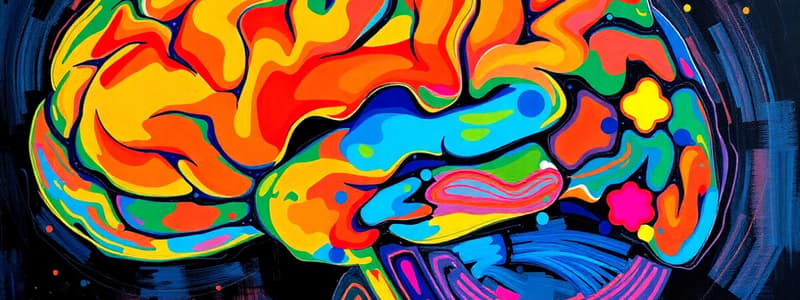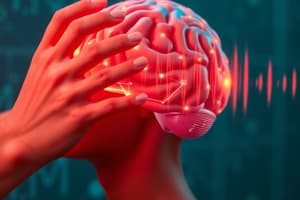Podcast
Questions and Answers
What is the most accurate estimate of the capacity of working memory?
What is the most accurate estimate of the capacity of working memory?
- Approximately 4 items (correct)
- Approximately 7 items
- Unlimited capacity
- Approximately 10 items
Which type of map is specifically related to the prediction of eye movements based on the relative interest of scene regions?
Which type of map is specifically related to the prediction of eye movements based on the relative interest of scene regions?
- Saliency Map (correct)
- Priority Map
- Spatial Map
- Cognitive Map
What is a key characteristic of change blindness?
What is a key characteristic of change blindness?
- An automatic response to visual stimuli
- The inability to detect a change when it occurs slowly
- A distortion introduced by exogenous stimuli (correct)
- Failing to notice salient stimuli
In which part of the brain is the striatum located, which plays a role in motor output gating?
In which part of the brain is the striatum located, which plays a role in motor output gating?
What phenomenon describes the inability to see a salient stimulus while focusing on another task?
What phenomenon describes the inability to see a salient stimulus while focusing on another task?
What does bradykinesia specifically refer to within the context of Parkinson's disease?
What does bradykinesia specifically refer to within the context of Parkinson's disease?
What is the primary function of mirror neurons?
What is the primary function of mirror neurons?
What is the main purpose of performing split-brain surgery?
What is the main purpose of performing split-brain surgery?
Which of the following describes structural brain deficits?
Which of the following describes structural brain deficits?
Which hemisphere of the brain is primarily associated with logical thinking and language production?
Which hemisphere of the brain is primarily associated with logical thinking and language production?
What is a significant impact of orbitofrontal damage on social cognition?
What is a significant impact of orbitofrontal damage on social cognition?
Which area of the brain is primarily associated with executive functions such as cognitive flexibility and planning?
Which area of the brain is primarily associated with executive functions such as cognitive flexibility and planning?
Which brain region is involved in emotion regulation and conflict monitoring during social interactions?
Which brain region is involved in emotion regulation and conflict monitoring during social interactions?
What cognitive phenomenon illustrates the interference between automatic processes and less practiced tasks?
What cognitive phenomenon illustrates the interference between automatic processes and less practiced tasks?
Which brain structure is specifically mentioned as being involved in motor control and action inhibition?
Which brain structure is specifically mentioned as being involved in motor control and action inhibition?
What is a primary advantage of ECoG compared to EEG?
What is a primary advantage of ECoG compared to EEG?
Which of the following best describes the primary use of fMRI?
Which of the following best describes the primary use of fMRI?
What limitation does EEG face due to the Inverse Problem?
What limitation does EEG face due to the Inverse Problem?
What is one of the key characteristics of TMS?
What is one of the key characteristics of TMS?
Which imaging technique is primarily used for assessing brain structure rather than function?
Which imaging technique is primarily used for assessing brain structure rather than function?
In what way does DWI differ from standard structural MRI?
In what way does DWI differ from standard structural MRI?
What does the term BOLD in fMRI stand for?
What does the term BOLD in fMRI stand for?
Which method is most sensitive to detecting currents occurring on the surface of the scalp?
Which method is most sensitive to detecting currents occurring on the surface of the scalp?
What is a notable drawback of CT scans compared to other imaging techniques?
What is a notable drawback of CT scans compared to other imaging techniques?
What is the definition of a gyrus in the cerebral cortex?
What is the definition of a gyrus in the cerebral cortex?
Which hypothesis suggests that a single neuron can recognize complex objects?
Which hypothesis suggests that a single neuron can recognize complex objects?
What role does the fusiform face area play in the brain?
What role does the fusiform face area play in the brain?
Around what age does the cognitive ability to represent the beliefs of others develop?
Around what age does the cognitive ability to represent the beliefs of others develop?
Which area of the brain is involved in reasoning about the intentions and beliefs of others?
Which area of the brain is involved in reasoning about the intentions and beliefs of others?
What is the main distinction between the 'grandmother cell' hypothesis and ensemble coding hypothesis?
What is the main distinction between the 'grandmother cell' hypothesis and ensemble coding hypothesis?
What does the term 'sparse coding' refer to in the context of neural representation?
What does the term 'sparse coding' refer to in the context of neural representation?
The RTPJ is involved in which aspect of social cognition?
The RTPJ is involved in which aspect of social cognition?
What is the primary role of dopamine in the context of reward processing?
What is the primary role of dopamine in the context of reward processing?
In the context of fMRI observations during the Marshmallow Test, what was revealed about low delayers?
In the context of fMRI observations during the Marshmallow Test, what was revealed about low delayers?
What does the term 'field of view' refer to in recording methods?
What does the term 'field of view' refer to in recording methods?
How does the amygdala relate to implicit bias in individuals?
How does the amygdala relate to implicit bias in individuals?
What type of memory retrieval is the hippocampus critically involved in?
What type of memory retrieval is the hippocampus critically involved in?
Which area is associated with anomia and its language-related functions?
Which area is associated with anomia and its language-related functions?
Which component is considered the central part of the ventral striatum?
Which component is considered the central part of the ventral striatum?
Which phenomenon describes the vulnerability of newer memories as opposed to older ones?
Which phenomenon describes the vulnerability of newer memories as opposed to older ones?
Flashcards
Working memory
Working memory
The ability to hold a limited amount of information in mind for a short period, usually about 4 items.
Long Term Memory
Long Term Memory
Storing information for long periods; technically unlimited capacity, but retrieval can be complex due to factors like forgetting or interference.
Saliency Map
Saliency Map
A theoretical representation that highlights the most attention-grabbing parts of a scene, helping our eyes focus on those areas first.
Priority Map
Priority Map
Signup and view all the flashcards
Change Blindness
Change Blindness
Signup and view all the flashcards
EEG (Electroencephalogram)
EEG (Electroencephalogram)
Signup and view all the flashcards
ERPs (Event-Related Potentials)
ERPs (Event-Related Potentials)
Signup and view all the flashcards
fMRI (Functional Magnetic Resonance Imaging)
fMRI (Functional Magnetic Resonance Imaging)
Signup and view all the flashcards
TMS (Transcranial Magnetic Stimulation)
TMS (Transcranial Magnetic Stimulation)
Signup and view all the flashcards
ECoG (Electrocorticogram)
ECoG (Electrocorticogram)
Signup and view all the flashcards
DWI (Diffusion-Weighted Imaging)
DWI (Diffusion-Weighted Imaging)
Signup and view all the flashcards
CT (Computed Tomography)
CT (Computed Tomography)
Signup and view all the flashcards
PET (Positron Emission Tomography)
PET (Positron Emission Tomography)
Signup and view all the flashcards
MEG (Magnetoencephalography)
MEG (Magnetoencephalography)
Signup and view all the flashcards
VLSM (Voxel-Based Lesion-Symptom Mapping)
VLSM (Voxel-Based Lesion-Symptom Mapping)
Signup and view all the flashcards
Bradykinesia
Bradykinesia
Signup and view all the flashcards
Mirror Neuron
Mirror Neuron
Signup and view all the flashcards
Split Brain Surgery
Split Brain Surgery
Signup and view all the flashcards
Structural Brain Deficits
Structural Brain Deficits
Signup and view all the flashcards
Metabolic/Functional Brain Deficits
Metabolic/Functional Brain Deficits
Signup and view all the flashcards
Orbitofrontal Cortex (OFC)
Orbitofrontal Cortex (OFC)
Signup and view all the flashcards
Dorsolateral Prefrontal Cortex (DLPFC)
Dorsolateral Prefrontal Cortex (DLPFC)
Signup and view all the flashcards
Inhibitory Control
Inhibitory Control
Signup and view all the flashcards
Anterior Cingulate Cortex (ACC)
Anterior Cingulate Cortex (ACC)
Signup and view all the flashcards
Sulcus
Sulcus
Signup and view all the flashcards
Gyrus
Gyrus
Signup and view all the flashcards
Fissure
Fissure
Signup and view all the flashcards
Hierarchical Coding Hypothesis
Hierarchical Coding Hypothesis
Signup and view all the flashcards
Gnostic Unit
Gnostic Unit
Signup and view all the flashcards
Theory of Mind
Theory of Mind
Signup and view all the flashcards
Right Temporo-Parietal Junction (RTPJ)
Right Temporo-Parietal Junction (RTPJ)
Signup and view all the flashcards
Medial Prefrontal Cortex (mPFC)
Medial Prefrontal Cortex (mPFC)
Signup and view all the flashcards
What is the role of dopamine in reward prediction?
What is the role of dopamine in reward prediction?
Signup and view all the flashcards
What is the role of the VTA?
What is the role of the VTA?
Signup and view all the flashcards
What is the functional role of the ventral striatum?
What is the functional role of the ventral striatum?
Signup and view all the flashcards
What is the nucleus accumbens (NAc) and its role in reward?
What is the nucleus accumbens (NAc) and its role in reward?
Signup and view all the flashcards
What is the ventral part of the Putamen and its role in reward?
What is the ventral part of the Putamen and its role in reward?
Signup and view all the flashcards
How does the Implicit Association Test (IAT) work?
How does the Implicit Association Test (IAT) work?
Signup and view all the flashcards
What brain area do individuals with greater implicit bias recruit to control their responses?
What brain area do individuals with greater implicit bias recruit to control their responses?
Signup and view all the flashcards
How is the error-related negativity (ERN) connected to implicit bias?
How is the error-related negativity (ERN) connected to implicit bias?
Signup and view all the flashcards
Study Notes
Neuro Final Exam - Cognitive Neuroscience Methods
- Expect questions on the strengths and weaknesses of various cognitive neuroscience methods, including: EEG/ERP, ECOG, fMRI, TMS, VLSM, structural MRI, DTI/DWI, PET, MEG.
- Assess factors of spatial resolution, timing resolution, causality, invasiveness, and sensitivity to neurotransmitters.
EEG (Electroencephalogram)
- Measures brain waves via scalp recordings.
- Records event-related potentials (ERPs), which are positive or negative voltage peaks occurring after a stimulus.
- Non-invasive.
- Better temporal resolution than spatial resolution.
- Useful for precisely measuring when brain activity occurs but struggles to pinpoint precise location.
- Neurotransmitters can affect EEG readings.
- The inverse problem is a limitation; it's difficult to determine the exact locations and distributions of electrical sources in the brain based on electrode recordings.
ECOG (Electrocorticogram)
- Intracranial EEG – electrodes implanted directly on the brain surface,
- Invasive.
- Better spatial resolution than EEG.
- Used to record brain waves.
fMRI (Functional Magnetic Resonance Imaging)
- Non-invasive.
- Measures brain activity based on changes in blood oxygen level-dependent(BOLD) signal, as brain activity uses oxygen which changes the magnetic state of blood.
- Modest temporal resolution.
- Useful for robust signals.
- Neurotransmitters can indirectly affect BOLD signal through their interaction with neurons and resulting blood flow changes.
TMS (Transcranial Magnetic Stimulation)
- Non-invasive.
- Using a focal magnetic pulse to induce a current that flows through the tissue.
- Relatively moderate spatial resolution.
- Higher temporal precision.
VLSM (Voxel-Based Lesion-Symptom Mapping)
- Combines structural brain images with neuropsychological tests to diagnose neurological damage.
- Helps determine how brain damage affects cognitive and behavioral tasks.
Structural MRI
- Non-invasive.
- Provides static images of anatomy.
- Can detect certain metals in the body.
DWI (Diffusion Weighted Imaging), DTI (Diffusion Tensor Imaging)
- Part of a structural MRI
- Measures water diffusion.
- Can assess tissue integrity.
- Used to detect cellular swelling etc.
CT (Computed Tomography)
- X-ray based
- Computes 3D images from 2D images.
- Inexpensive.
- Non-invasive.
PET (Positron Emission Tomography)
- Injects a radioactive agent.
- Measures metabolic activity in the brain.
- Non-invasive.
MEG (Magnetoencephalography)
- Measures magnetic fields produced by electrical currents in the brain.
- More sensitive to scalp currents than EEG.
- Better spatial resolution than EEG.
- Non-invasive.
Long-Term Memory
- Declarative Memory (explicit): consists of Episodic and Semantic memory.
- Episodic - memories of personal events
- Semantic - facts and general knowledge
Non-Declarative Memory (implicit):
- Procedural memories
Working Memory
- System that temporarily holds and manipulates information.
- Prefrontal cortex plays a central role
Patient H.M.
- Surgery resulted in severe anterograde amnesia (inability to form new declarative memories)
Memory Systems
- Discuss the different memory systems:
- Short-term memory
- Sensory memory
- Working memory
- Long-term memory
Deep Brain Stimulation
- Invasive
- Electrodes placed in cortex.
- Treatment for Parkinson's and Huntington's disease
Brain Structures (supporting memories).
- Hippocampus-first person memory encoding, storage, and retrieval
- PFC-working memory and executive function
- Basal Ganglia-procedural memory
- Medial Temporal Lobe-long term memory
Cognitive neuroscience methods (strengths and weaknesses).
- Comparison of various methods.
- How neuroimaging methods measure and asses neural processing
Representation and Transformation of information in the brain
- Top down approach
- Marr's 3 levels: Computation, Representation, and Hardware
Metabolic/Functional Brain Deficits
- How brain activity and energy use can be impacted
- Neurotransmitter imbalances and disorders (e.g., depression, schizophrenia, and Parkinson's) affect the proper functioning of the brain.
- Use of brain imaging(e.g., fMRI, PET scan, EEG) to study brain function and metabolic activities
Saliency and Priority Map
- Theoretical constructs used to predict eye movements of attention
- Bottom-up map of scene regions of relative interest.
Split Brain Surgery
- Corpus callosum cut to inhibit excess firing
- Used to treat severe epilepsy
Language Network
- Broca's area (non-fluent aphasia)
- Wernicke's area (fluent aphasia)
- Arcuate fasciculus
- Different brain areas and functions associated with language processing
Face Processing
- Fusiform face area (FFA) – facial recognition
- Inferior temporal lobe – ventral/lateral pathway
- Theory of mind and social cognition involves representation of others' intentions, perspectives, beliefs.
Implicit Bias
- Unconscious stereotyping and discriminatory behaviors
- Measured and assessed using reaction-time tasks like the Implicit Association Test.
- Correlation between activation in the amygdala and implicit bias
- Implications on social cognition.
Mentalization
- Process by which we represent information in the minds of others
- Role of the superior temporal sulcus, angular gyrus, and intraparietal sulcus in this process.
- How mindblindness affects this process.
- How injuries to this area affect social behaviour.
- Role of different parts of the brain in mentalization (e.g., medial prefrontal cortex, posterior superior temporal sulcus, amygdala).
Studying That Suits You
Use AI to generate personalized quizzes and flashcards to suit your learning preferences.





